Princeton University President Christopher L. Eisgruber met with Princeton Mayor Liz Lempert (center, left) and members of the town council Monday, Feb. 26, to discuss topics including the University’s Campus Plan, town-gown partnerships, the innovation ecosystem, immigration and sustainability.
Princeton University President Christopher L. Eisgruber joined Princeton town officials Monday, Feb. 26, for a wide-ranging discussion on topics of joint interest, including the University’s Campus Plan, town-gown partnerships, the innovation ecosystem, immigration and sustainability.
The public discussion at Monument Hall in Princeton highlighted the close relationship between the University and the town, its home since 1756. Eisgruber met with Mayor Liz Lempert and Princeton Council members David Cohen, Jenny Crumiller, Leticia Fraga, Heather Howard, Lance Liverman and Timothy Quinn.
“The strength of the University, I think, depends on the strength of the town of Princeton and the strength of the state of New Jersey,” Eisgruber said. “We are grateful to have this opportunity to talk to this council, exchange ideas and find ways we can work together.”
Lempert said, “This does mean a lot to council and the community to have this conversation.”
Eisgruber noted that the conversation — the fifth such meeting between Eisgruber and town officials — was scheduled soon after the release of the University’s Campus Plan, a framework designed to guide campus development over the next 10 years in the context of potential needs and developments over the next 30 years.
He emphasized the importance of the planned expansion of the University’s undergraduate student body, the University’s emphasis on growing the region’s innovation ecosystem and continuing sustainability efforts on campus and in town.
In advance of the meeting, the University shared with town officials a summary of the many ways the University contributes to and engages with the community.
Quinn focused his remarks on the economic implications of the Campus Plan on the town, noting that University-affiliated businesses such as the University Store, Labyrinth Books and Princeton Garden Theatre already serve as anchors in the downtown area. He expressed hope that the University will locate new spaces for innovation in town — in addition to the eHub on Chambers Street.
Eisgruber said he expects new innovation activity to happen both in town and on University lands in neighboring West Windsor, emphasizing the importance of open communication on land use and zoning issues to facilitate projects of joint interest.

Eisgruber, with Council member Jenny Crumiller, emphasized the importance of the planned expansion of the University’s undergraduate student body, the University’s emphasis on growing the region’s innovation ecosystem and continuing sustainability efforts on campus and in town.
Another area of discussion was partnerships between the town and the University. For example, Liverman said the University answered his requests to do more to help residents find jobs with efforts including Careers @ Princeton workshops held in coordination with the Princeton Public Library.
“The University has hired people within the town recently,” he said. “They’ve also extended a marvelous career development program that is extremely, extremely welcome.”
Fraga highlighted the contributions by the University, its faculty, staff and students to efforts that support the Send Hunger Packing program, provide free transportation to the local hospital via TigerTransit, and assist the Latin American Defense and Education Fund with its community ID program.
“I have had the opportunity to interact with members of your faculty and staff and know that when the need arises we have been able to collaborate on finding solutions that improve the quality of life in our community,” Fraga said.
Eisgruber said the University remains focused on service in keeping with its mission. Areas of emphasis, he said, include attracting more businesses and jobs to the region and finding ways to interact around a shared interest in innovation.
“We're a mission-driven institution with a commitment to teaching and research of unsurpassed quality that makes a difference in the world for the better and with a pervasive commitment to service,” he said. “We look for opportunities then to put that mission to work to make a difference at a global level and the local level.”
Howard expressed continued concern about the fate of the Deferred Action for Childhood Arrivals (DACA) program, which the Trump administration has moved to end and is now the subject of several lawsuits, including one jointly filed by the University, Microsoft and a Princeton undergraduate. For its part, she said, the town has been working to strengthen ties with its immigrant community and working to build a “welcoming community.”
Eisgruber applauded the town’s efforts and said the University is “committed to the legal fight. We believe the issues are important.” He said he is continuing to discuss immigration issues with lawmakers in Washington.
Along with DACA, Eisgruber has also spoken out on efforts to curtail Temporary Protected Status for some immigrants.
“We are drawing on talent from all over the world,” Eisgruber said. “I know the fight is worth fighting. We will keep at it. We hope to be a leader on it.”
On the issue of sustainability, Lempert expressed hope that the University will continue to look for opportunities to share best practices with the town and look for opportunities to bring new ideas and innovations to the community. Lempert and Cohen also discussed parking in town and how it is related to sustainability.
Eisgruber said the University is working to encourage fewer of its faculty and staff to commute in single-occupancy vehicles and is looking to minimize the construction of new parking. In addition, Eisgruber said the University will continue to set challenging long-term targets for increasing sustainability on campus.



